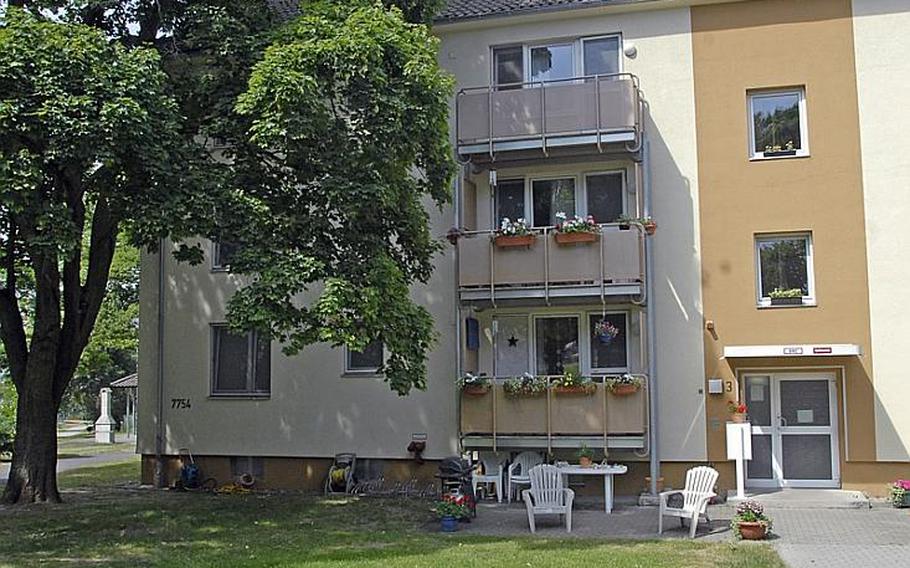
Junior enlisted soldiers arriving to Europe with their families can count on living in government housing such as this family housing unit in Wiesbaden, Germany's Hainerberg community. A new policy is being implemented for Army garrisons around Europe to house 100 percent of all accompanied privates to staff sergeants on post, if housing is available, along with up to 10 percent of accompanied senior enlisted troops and officers. (Mark Patton/Stars and Stripes)
WIESBADEN, Germany — Junior enlisted soldiers arriving in Europe with their families this summer will be given priority for on-base military family housing, following a policy adopted earlier this year for U.S. Army garrisons in Europe.
The policy requires garrisons to house 100 percent of all accompanied personnel from private to staff sergeant on post, along with up to 10 percent of accompanied senior enlisted troops and officers, according to Installation Management Command-Europe officials.
Currently, there are approximately 11,875 junior-enlisted families in Europe with 8,699 of those families living in on-post housing and the rest living off-base, or “on the economy.”
Under the policy, adopted in March by U.S. Army Europe and IMCOM-Europe, key and essential personnel, such as those required to man 24-hour operations centers, also will be mandated to live in on-post housing when possible, according to Kenneth Day, IMCOM-Europe chief of housing.
Day said senior enlisted troops and officers can live in on-post housing only if there are vacancies after all the junior-enlisted families have been moved in. He added, however, that exceptions can be granted on a case-by-case basis, such as families enrolled in the Exceptional Family Member Program. That program caters to family members who have special medical or educational needs.
IMCOM officials said the policy will be enforced as new troops arrive and housing becomes available. Families won’t be forced to move from current residences, but when they do those residences will be provided to junior enlisted soldiers with families.
Some soldiers with U.S. Army Garrison Wiesbaden’s Headquarters and Headquarters Detachment think that each individual unit should decide where its soldiers live.
“Instead of the rank, look at the age of the person … if you have a 30-year old [private], he may not have the rank but he may be more mature,” said Sgt. Travis Kennedy.
“A young captain can get in just as much trouble as a private,” added Cpl. Crystal Williamson.
IMCOM-Europe spokesman Tom Saunders said he didn’t know whether the policy would save money or cost more money. But housing allowances are based on rank, and senior enlisted soldiers are entitled to higher housing allowances off-base than are junior-enlisted soldiers.
“From our perspective, it’s all about taking care of the junior enlisted soldiers,” Saunders said.
Day said requiring accompanied junior enlisted soldiers to live on base also will be less complicated than having them navigate the Europe rental market on their initial overseas tours.
“The senior NCOs and officers, they’re better prepared to take the cultural shock of their first tour in Europe living on the economy,” Day said.
In 2007, IMCOM-Europe issued a command-wide memo stating that a more than $1 billion shortfall in the Army’s military pay account meant it was necessary to conserve funds. As one measure, garrison commanders were instructed to put families in family housing where available. But the measure did not guarantee on-post housing for junior enlisted troops, so many residences went to senior enlisted soldiers and officers. The new policy aims to give junior enlisted troops and their families on-base housing priority.
The policy differs from what most junior troops are accustomed to stateside, where families of all ranks generally have a choice whether to live on or off post.
One soldier in Europe said the policy makes sense for younger troops.
“I think it’s good; a lot of people don’t realize the cost with off-post housing,” said Staff Sgt. Lynn Jones, who added the policy makes sense for younger troops not used to living on the economy, but said that once soldiers reach sergeant, they should be able to choose to live off post.
The USAG Bamberg community has already felt the effect of the change. Over the past three months, 226 residences have been reallocated for junior enlisted families.
Lt. Col. Gary Rosenberg, the Bamberg commander, said the new policy is the right thing to do, because “it gives junior enlisted members assurance that their housing and community needs are a priority.”